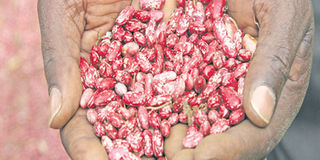Alarm as fake seed merchants come up with new ways of selling products

Bean seeds. Farmers have been asked to always use certified seeds and often activate the seed security labels on the packaging of seeds they buy to enhance the effectiveness of the campaign to eradicate fake seeds. FILE PHOTO | NMG
What you need to know:
- The devious seed dealers seemingly resorted to using this technique to fraud farmers, after efforts of authorities in the seed sector to curtail the vice began bearing fruits.
- The seed sticker label model, for instance, has continually emerged effective in stamping out fake seed as each packaging had a unique code which a farmer had to send to the Kephis systems for verification, according to the TASAI report.
- Farmers have however been asked to often activate the seed security labels on the packaging of seeds they buy to enhance the effectiveness of the campaign to eradicate fake seeds.
Unscrupulous seed merchants have devised new ways to dispense counterfeit seeds even as the fight against these seeds’ spread is continuing, a study conducted to evaluate the structure and economic performance of the country’s seed sector has indicated.
The study named the Africa Seed Access Index (TASAI), pointed out that these seed merchants collude with corrupt businesspeople to produce seed packaging material in excess of the orders they receive from seed companies, with the extra packaging material, in turn used to package and sell uncertified seeds.
The devious seed dealers seemingly resorted to using this technique to fraud farmers, after efforts of authorities in the seed sector to curtail the vice began bearing fruits.
The seed sticker label model, for instance, has continually emerged effective in stamping out fake seed as each packaging had a unique code which a farmer had to send to the Kenya Plant Health Inspectorate Services (Kephis)systems for verification, according to the TASAI report.
Despite only 17 reported cases of fake seed sales in the country in 2017 –which mainly involved imitation and packaging materials, this figure is likely to be an underestimate as most cases of fake seed sales are never formally reported.
Farmers have however been asked to often activate the seed security labels on the packaging of seeds they buy to enhance the effectiveness of the campaign to eradicate fake seeds.
“At 72 percent, most seed companies are however largely satisfied with the Government’s efforts to stamp out the fake seed menace. This is an improvement from the rating of 50 percent in 2015,” said Dr Michael Waithaka, a researcher and co-author of the TASAI Kenya Brief 2018.
The report acknowledged the Government’s resolve to eliminate fake seeds by reviewing seed laws and regulations to foster compliance, and human and physical capacity building, as well as creating awareness and enhancing collaborations with security agencies.
“The roll-out of the free sms-based system called Mulika Mbegu Mbovu (stop bad seed), which enables farmers to report seed quality issues directly to Kephis and the creation of awareness among farmers on how to identify fake seed, and to buy seed from approved merchants and not from open markets, have also played a key role in frustrating the efforts of counterfeit seed dealers,” said Duncan Onduu, who is the Seed Trade Association of Kenya (STAK) Executive officer.





